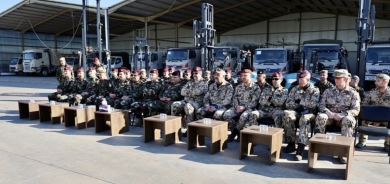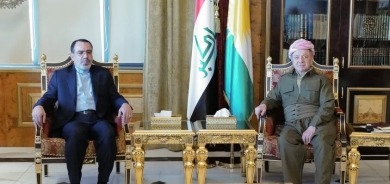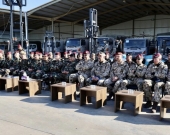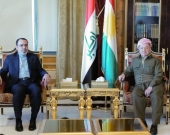How Oil May End a Conflict (for Once)

While post-occupation Iraq is no one’s idea of a democratic model – and certainly not the inspiration for the Arab Spring, as some gung ho neo-cons now claim – the dysfunction in Baghdad and continuing violence have created common interests between Iraqi Kurds and their longtime ethnic foes to the north, Turkey.
The Turks and the Kurds, now spread between areas of Syria, Iraq, Iran, Armenia and Turkey itself, have vied for control of this mountainous region for centuries. The conflict got militarized in the early 1970s, when years of oppression by Turkey of the Kurdish language and culture sparked a Marxist guerrilla war waged with terrorist tactics by a group called the PKK (Kurdistan Workers’ Party).
The conflict, which has been raged with ferocity by both sides ever since, in recent years sparked Turkish incursions over the Iraq border, where PKK formations shelter in the high mountains that line the frontier. (This is another thing that gets too little coverage; the International Crisis Group estimates that up to 1338 people died in this fighting between 2008 and 2010, including 136 civilians).
This is an unpromising canvas on which to draw up closer ties. And yet, that’s precisely what is happening, thanks to a thirst for oil in fast growing Turkey, and a quest to bypass Baghdad’s snake pit politics on the part of the Kurdistan Regional Government (KRG), which governs Iraq’s northern provinces with a degree of autonomy.
Ever since last week, news has broken almost daily of deals struck by the KRG with foreign oil companies, including Exxon-Mobil, Norway’s Statoil, France’s Total and others. These developments have the potential to provide self-sufficiency over time from the government in Baghdad. At the moment, Kurdish oil gets processed and burned within Iraq, as the only route to future markets (outside smugglers in tanker trucks) would be through pipelines controlled by the central government.
With the current Shiite Iraqi government beholden to Iran and gridlocked by opposition from the parliament’s Kurdish and Sunni blocs, a long awaited oil law that would define the terms under which regions like Kurdistan would benefit from oil extracted locally is going nowhere. So the Kurds have taken matters into their own hands.
Who can blame them? With an unfriendly Iran on one side, the chaos of Syria on another and limited influence to get Baghdad to move, the KRG decided to deepen ties with the ancient enemy, Turkey. In the last month, plans to build two new pipelines to carry the KRG’s oil north have been agreed, joining a third that carries natural gas. All would be financed through Turkey and supply the Turkish market.
Why, you might ask, would Baghdad allow the Kurds to go forward with such projects?
For one thing, Baghdad may not want anyone to know how relatively powerless they are to stop them. Prime Minister Nouri al-Maliki is increasingly reliant on Iran to stay in power. Last week, even the pro-Tehran Shia hothead Moqtada al-Sadr abandoned Maliki, demanding he submit to a vote of no confidence. But Tehran apparently believes Maliki remains useful, and has reined in al-Sadr. So he stays for now.
So Baghdad has other problems. And besides, the Iraqi central government may also feel the threat of Kurdish separatism has receded for the moment. While the KRG is eager to export its oil, it has no desire to lose the large revenue sharing benefits it currently enjoys from Baghdad – at least not until its northern fields have found lucrative foreign markets.
Under provisional Iraqi regulations now in place, Kurdistan’s regional government currently gets a 17 percent share of Iraq’s national oil revenues, and that covers about 95 percent of the regional government’s budget. Even with pipelines to Turkey and giants like Exxon and Total pumping with all their might – all of which are years away - it is still questionable whether KRG export earnings could equal or exceed that 17 percent share of federal Iraqi revenue. This explains the careful steps the KRG is taking not to provoke the center, including a pledge to only keep 17 percent of the export proceeds, distributing the rest to its Iraqi cousins.
So what’s in it for Turkey, and why after decades would the Turks suddenly find common ground with the KRG? Certainly inside Turkey, the war against the PKK continues – 2) died in clashes just today.
But Turkey is feeling isolated. With Iraq developing into a de facto Iranian satellite and Turkey’s ties with the Assad regime in tatters, Ankara has found itself increasingly isolated and without friends in Iraq now that the US is gone. The Kurdish official, who spoke on condition of anonymity, said that even as clashes between Kurds and Turkish security forces continue inside Turkey, the government in Ankara has adopted a more pragmatic view of Kurdish nationalism outside its own borders. A little Kurdistan on the border beats a big one constantly threatening to erupt inside.
But the prospect of a reliable source of oil on its border also has thrown new light on the value of good relations with the Iraqi Kurds. After years of denying that there was any such thing as a Kurd – (they were legally categorized as “mountain Turks” into the 1980s by Ankara’s military rulers) – Turkey apparently has come to terms with the idea of a homeland for Kurds, as long as it’s not on Turkish territory, and as long as the energy it produces fuels Turkey’s booming economy.












